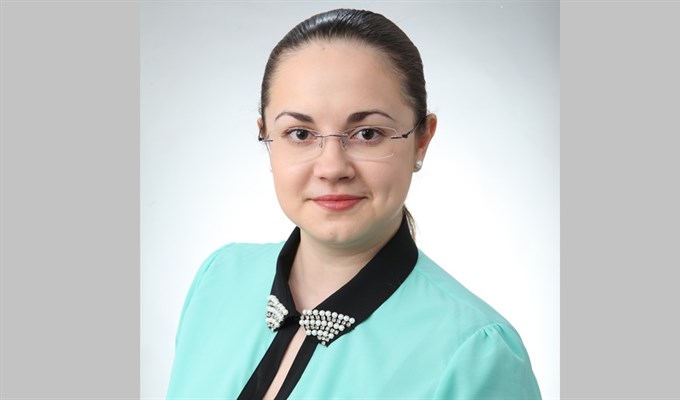TOMSK, Aug 2 – RIA Tomsk. The research of the young scientist of Tomsk Polytechnic University (TPU) Evgenia Frantsina, devoted to molecular modeling in hydrocarbons, will bring the scientific community closer to the creation of an ideal frost-resistant fuel. Details – in the material of RIA Tomsk.
Fan of petrochemistry
Evgenia Frantsina first came to Tomsk Polytechnic University in 2003 – as a student. After five years she graduated with honors the specialty "Chemical technology of natural energy carriers and carbon materials" and got the diploma of the winner of "The best student of TPU" contest. After that, the girl continued to study chemical technologies and petrochemistry in postgraduate study of TPU.
A serious passion for science and excellent knowledge of English allowed Evgenia to undergo internships in leading organizations in their profile, including Delft University of Technology (Netherlands) and University of Southampton (Great Britain).
Today Evgenia is a Candidate of Technical Sciences and a research assistant of the Department of Chemical Engineering of Institute of Natural Resources Engineering School. Evgenia conducts her research in the team of the scientific school on mathematical modeling of oil refining and petrochemical processes (the head of the school – is the Professor Emilia Dmitrievna Ivanchina, Doctor of Engineering Science).
All this experience allowed Evgenia to successfully declare itself at the contest of studies for young scientists, conducted by the Russian Science Foundation (RSF). Her project to study the dependence of the composition and properties of diesel fuel was supported by the Foundation.
© с сайта ТПУ
Evgenia Frantsina
To create an "extreme diesel"
The work is called "Development of theoretical ideas on the intermolecular interaction of hydrocarbons in diesel fuel compositions based on molecular modeling".
This project was selected out from hundreds of others for understandable reasons. In the context of Russia's new economic development strategy, more attention is paid to deep oil refining processes that are necessary to produce high quality hydrocarbon fuels.
"This task is especially important due to the growing demand for winter and Arctic brands of diesel fuel for use in cold climatic zones. It is connected with the fact that most of the territory of our country is located in cold climate zones, as well as with the need to develop the strategic territories of the Arctic", – tells Frantsina.
Within the project Evgenia found out that today there is a shortage of diesel fuel brands in Russia for use in cold climates. Approximately 90% of the total production of the "diesel" –are the so-called summer fuels. And only 9% falls on winter brands: the temperature of their congealing is equal to 35-45 degrees of frost.
"Another about 1% of the total volume – is the Arctic "diesel", which solidifies at minus 55 degrees. This is an extremely small quantity. Therefore the organization of production of low-solidification diesel for the Far North and the Arctic – is a very urgent task", – comments the author of the project.
Scientific problem
© предоставлено пресс-службой ТПУ
"Extreme" diesel fuel must meet a number of requirements: it is the established operating rules in conditions of low temperatures, flammability and heating value (pour point, energy intensity, and so on).
"All these properties are determined by the hydrocarbon composition of the mixed fractions with intermolecular interaction of components of different chemical nature. To create a more perfect diesel fuel, a common understanding of the intermolecular interaction between the components of diesel fuel compositions is necessary. But today in science such a description does not exist", – says Franzina.
According to the young scientist, it is connected with the complexity of evaluating the intermolecular interaction, as well as with the inadequate development of molecular modeling methods, in particular quantum-chemical methods for calculating the electronic structure of molecules.
The Tomsk project has to solve this scientific problem. Its team will have to formulate theoretical ideas about the nature of intermolecular interaction in hydrocarbon systems. On their basis it will be possible to develop approaches for determining the optimal hydrocarbon composition of the "extreme diesel".
Such fuel will have a maximum calorific value even in very severe frost, while remaining low-flammable at the same time.
Capricious composition
"Diesel fuel –is a complex chemical system consisting of hydrocarbons of various groups, added modifiers and additives (they improve the operating properties)", –tells Evgenia. – Hydrocarbon groups have different effects on fuel. For example, n-paraffins have high cetane number, so they improve the flammability index. While at the same time they degrade the low-temperature properties".
Another example is – iso-paraffins: they have good low-temperature properties, but they significantly decrease the flammability of the fuel. Polycyclic aromatic hydrocarbons are normalized by all-Union State Standard, and their content should not exceed 8%, as they have a negative impact on the flammability of fuel and on the environment.
"Therefore, it is very important to determine the optimal hydrocarbon composition of diesel fuel compositions to provide maximum calorific value while maintaining the requirements for flammability and low temperature properties", – the agency interlocutor said.
Scientific innovation
Polytechnicians will have to solve three scientific problems in the project. They will assess the effect of various hydrocarbon groups – paraffins, olefins, naphthenes and aromatic hydrocarbons – on the calorific value of diesel fuel compositions. After that, scientists will study the effect of initiators of combustion – alkyl nitrates. Then they will evaluate the intermolecular forces arising from the interaction of hydrocarbons of different chemical nature with additives.
To do this, they will apply quantum-chemical methods for calculating molecular complexes. This, according to Frantsina, will give the research a certain novelty along with the very fact of the development of theoretical ideas about the intermolecular interactions between the components of diesel fuel compositions and the evaluation of their contribution to the operational properties.
Projects of young
© РИА Томск. Таисия Воронцова
Earlier, the press service of Tomsk Polytechnic reported that the Russian Science Foundation supported the university's projects for more than 150 million rubles. These are 20 winners of two grant competitions – to conduct research by young scientists or scientific groups under the leadership of young scientists.
Evgenia's project was among the leaders of the first contest, which aims to support scientists under the age of 33, who defended their thesis. Grants for this competition are allocated until 2020.
Works of polytechnicians are devoted to a wide range of issues. This is high-resolution spectroscopy of the NH3 molecule in the interest of the problems of studying the atmospheres of the Earth and the planets of the Solar system. This is the definition of effective conditions for the ignition and combustion of composite fuels based on industrial wastes to improve the environmental performance indicators of energy facilities.
Young scientists will be engaged in the development of new heterogeneous and catalytic methods for the production of oxo derivatives of betulin, the creation of a methodology for the complex diagnosis of composite materials in the process of resonant ultrasonic vibrothermography, and the approbation of the Tomsk method of remote studies of natural phenomena, objects and phenomena in microwave and EHF ranges.
At once several projects are devoted to fuel issues – "Low-temperature resistant water-diesel micro-emulsified fuel" and "Development of scientific foundations for the processes of preparing motor fuels based on the chemical reaction of components in the catalytic conversion and compounding".
Polytechnicians will also determine the temperature fields of intensely evaporating drops of aqueous emulsions, solutions and suspensions using contactless optical techniques, will develop technologies for collecting and processing experimental data for X-ray tomography using machine learning methods, and will investigate the effect of electron energy on the disinfection of spring wheat seeds with a pulsed electron beam.
In addition, young Tomsk scientists will create a multi-mode control system for the motion of an uninhabited submarine with non-stationary parameters.
Besides, young Tomsk scientists will create a multimode control system of the movement of the uninhabited submersible with non-stationary parameters.